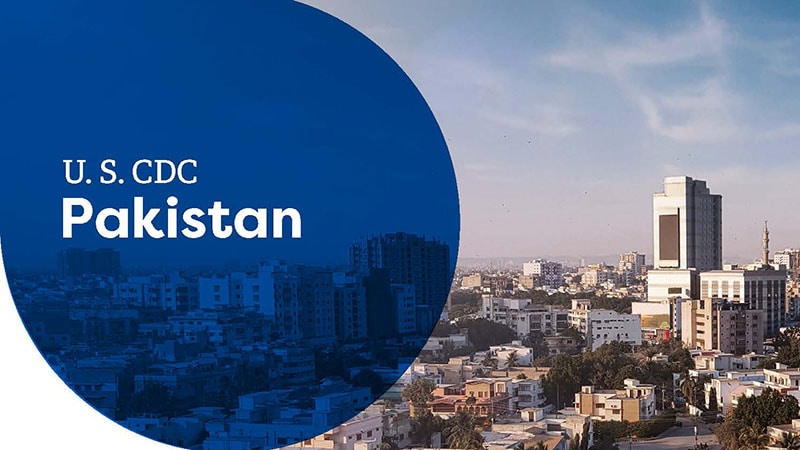At a glance
CDC Pakistan works with the Government of Pakistan and partners on various public health initiatives. Pakistan is part of CDC’S Middle East/North Africa regional platform which includes 25 countries, one regional office based in Oman, and the CDC Pakistan country office. Key activities focus on strengthening health systems as part of global health security as well as preventing and controlling polio, viral hepatitis, and other infectious diseases.

Overview

CDC has engaged with partners in Pakistan for more than 3 decades and established an in-country team in 2016. CDC works with several public health institutions in Pakistan, including the National Institute of Health (NIH) and provincial and district-level offices.
Alongside partners, CDC works to strengthen capacity and infrastructure for key public health issues, including:
- Global health security
- Emergency and pandemic preparedness
- Polio eradication
- Hepatitis surveillance
Global health security
Strategic focus
Pakistan’s National Public Health Institute (NPHI) strengthens the country’s capabilities to detect and respond to health threats. NPHI partners with other institutes to focus on research, environmental and occupational health, nutrition, non-communicable diseases, and vaccines.
CDC helped Pakistan complete the Joint External Evaluation (JEE) in 2023. The JEE evaluates public health capacities to help countries understand gaps in their national health security and focus on closing them.
CDC’s efforts help Pakistan increase capacities for disease surveillance, laboratory systems, workforce development, and emergency management and response.
Disease surveillance
CDC strengthens influenza surveillance in Pakistan through a cooperative agreement with the Pakistan NIH. Since 2004, five surveillance sites were established to conduct surveillance for influenza-like illness in outpatient settings. These sites also conduct surveillance for severe acute respiratory illness among hospitalized patients.
Pakistan is the only country where extensively drug resistant typhoid fever is regularly occurring. CDC works with local government, Field Epidemiology Training Program, and health security partners to expand surveillance for typhoid and waterborne diseases. CDC also enhances typhoid prevention and response efforts.
CDC engages in several projects related to many bacterial diseases in Pakistan.
Laboratory strengthening
The Global Laboratory Leadership Program (GLLP) began its first phase in Pakistan in 2019. GLLP strengthens the country's laboratory leadership and management capabilities, which are key functions in public health preparedness and response. The first cohort of GLLP in Pakistan graduated in 2023.
Four of Pakistan’s five disease surveillance sites established on-site laboratory capabilities for influenza testing to enhance rapid detection of influenza outbreaks.
Workforce development
CDC has supported Pakistan's Field Epidemiology and Laboratory Training Program (FELTP) since 2006. The Pakistan FELTP includes two tiers:
- FELTP-Advanced prepares epidemiologists for national-level public health leadership.
- FELTP-Frontline trains health workers as community-level epidemiologists.
FELTP has been a key technical asset during several health emergencies and was instrumental in establishing Pakistan’s first hepatitis surveillance sites. Ownership of the FELTP was officially transferred to the Government of Pakistan in December 2021.
Key achievements
- Establishing a CDC-supported national database to track influenza and hepatitis activity.
- FELTP fellows and graduates respond to several epidemics and emergencies.
Polio
Strategic focus
Pakistan is one of two countries where the spread of wild poliovirus has never been interrupted. As a key partner in the Global Polio Eradication Initiative (GPEI), CDC has strengthened polio eradication and immunization activities since 2012. CDC also partners with the GPEI Afghanistan and Pakistan Hub in Amman, Jordan to accelerate polio eradication efforts.
CDC's goals include:
- Optimize surveillance for acute flaccid paralysis (rapid onset of weakness or paralysis), which can be an indication of polio infection.
- Increase quality of supplemental immunization activities, such as mass polio immunization campaigns.
- Reduce the number of children missed during immunization campaigns.
- Increase vaccine acceptance through integrated service delivery and improved collaboration between GPEI and the Expanded Programme on Immunization.
- Improve data usage, compatibility of health information systems, and data-based risk and impact assessment for real time decision making at national, provincial, and district levels.
Key achievements
- Pakistan recorded only six cases of wild polio in 2023, compared to 20 recorded cases in 2022.
- The smaller geographic spread of wild poliovirus cases shows notable progress toward polio eradication.
- The smaller geographic spread of wild poliovirus cases shows notable progress toward polio eradication.
- All wild poliovirus cases since 2021 were reported from only 4 out of 171 districts.
- In partnership with FELTP and the Government of Pakistan, CDC established the National Stop Transmission of Polio Program (NSTOP) in 2012.
- Through NSTOP, CDC supports more than 80 Pakistani public health government professionals in 65 districts with high risk of polio.
- This spans across Islamabad and the Sindh, Khyber Pakhtunkhwa, and Balochistan provinces.
- Through NSTOP, CDC supports more than 80 Pakistani public health government professionals in 65 districts with high risk of polio.
Antimicrobial resistance (AMR)
Strategic focus
CDC works to improve healthcare infection prevention and control (IPC) and slow the spread of AMR in Pakistan. CDC helps increase local capacity to detect, track, and report drug-resistant fungi like Candida auris and other organisms.
CDC also supports whole-genome sequencing (WGS) of multidrug-resistant organisms. WGS can increase understanding of how healthcare-related spread of pathogens might be driving the spread of AMR in Pakistani communities.
CDC helps increase local capacities to:
- Detect invasive candidemia.
- Implement IPC practices at 12 sentinel hospitals.
- Conduct WGS and molecular characterization of AMR Candida auris.
Key achievements
CDC and partners:
- Implemented an IPC project at 10 large public hospitals.
- Trained more than 500 hospital staff to prevent the spread of infections.
Viral hepatitis
Strategic focus
Pakistan continues to experience spread of all forms of viral hepatitis. The country has one of the highest hepatitis C virus (HCV) infection rates in the world. It is estimated 4 to 5% of the population lives with HCV.
CDC has provided financial and technical support to viral hepatitis prevention and control in Pakistan for over 15 years. CDC continues to work with local partners to identify priority activities for implementation.
Key achievements
- CDC serves on the Technical Advisory Board for the Pakistan National Committee on Hepatitis.
- More than 24,000 people have been screened for hepatitis C, as of December 2021.
- More than 300 people diagnosed with chronic HCV infection were treated in informal urban settlements in Islamabad, as of December 2021.

